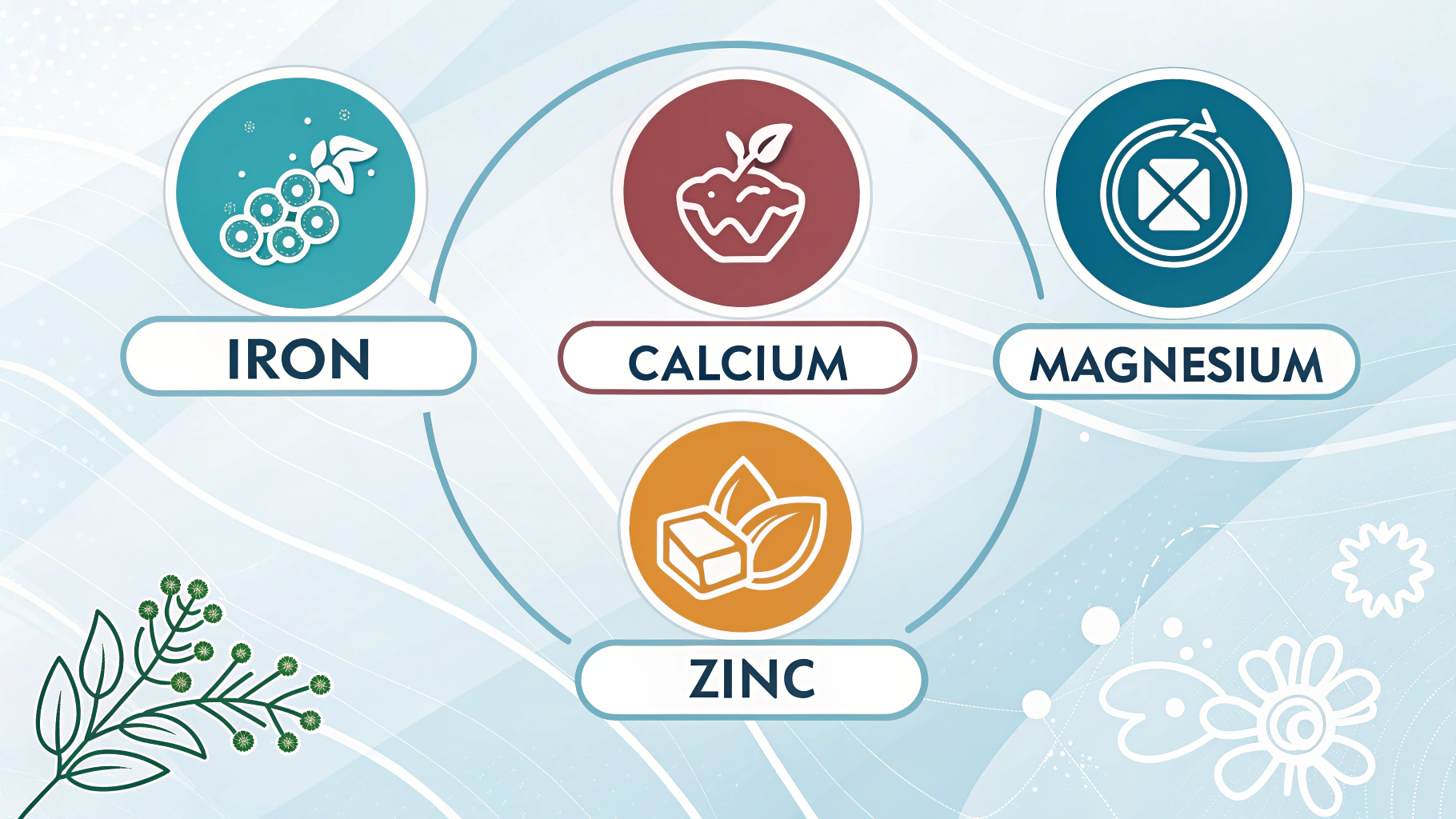In addition to water and organic matter (macronutrients), food also provides us with important minerals, which are sometimes essential to the proper functioning of our body. Here is an overview of these useful substances.

Understanding Minerals and Their Importance
Minerals are inorganic elements that our bodies need to function correctly. Unlike vitamins, which are organic and can be broken down by heat, air, or acid, minerals hold onto their chemical structure. This characteristic allows them to play crucial roles in various bodily processes, including bone formation, nerve function, and muscle contraction.
Important Minerals : Key Statistics on Mineral Deficiencies
Before diving into specific minerals, it’s essential to understand the prevalence and impact of mineral deficiencies:
- Iron Deficiency: According to the World Health Organization (WHO), iron deficiency is the most common nutritional disorder globally, affecting over 30% of the world’s population.
- Calcium Deficiency: The National Osteoporosis Foundation states that approximately 54 million Americans have low bone density or osteoporosis, a condition often linked to inadequate calcium intake.
- Magnesium Deficiency: Data from the National Institutes of Health (NIH) reveal that nearly 50% of Americans consume less than the recommended amount of magnesium from their diet.
These statistics underscore the critical need for awareness and proper intake of essential minerals.

Important Minerals : The Essential Minerals and Their Roles
1. Calcium
Function: Calcium is the most abundant mineral in the body, primarily stored in bones and teeth. It is crucial for bone health, muscle function, nerve transmission, and blood clotting.
Sources: Dairy products (milk, cheese, yogurt), leafy green vegetables (kale, broccoli), and fortified foods (orange juice, cereals).
Impact: Adequate calcium intake helps prevent osteoporosis and maintains strong bones. According to the NIH, adults aged 19-50 need 1,000 mg of calcium per day, increasing to 1,200 mg for women over 50 and men over 70.
2. Iron
Function: Iron is essential for the production of hemoglobin, a protein in red blood cells that carries oxygen throughout the body. It also plays a role in energy metabolism and immune function.
Sources: Red meat, poultry, fish, lentils, beans, and fortified cereals.
Impact: Iron deficiency can lead to anemia, characterized by fatigue and weakness. The WHO highlights that iron deficiency is a significant public health issue, particularly in developing countries. The recommended dietary allowance (RDA) for iron is 8 mg per day for men and 18 mg per day for women.
3. Magnesium
Function: Magnesium is involved in over 300 biochemical reactions in the body, including energy production, protein synthesis, and blood glucose control. It also supports muscle and nerve function, as well as maintaining a steady heartbeat.
Sources: Nuts and seeds (almonds, pumpkin seeds), whole grains (brown rice, oats), legumes, and green leafy vegetables.
Impact: A deficiency in magnesium can cause muscle cramps, mental disorders, osteoporosis, and fatigue. The NIH recommends a daily intake of 400-420 mg for men and 310-320 mg for women.
4. Potassium
Function: Potassium is vital for maintaining fluid and electrolyte balance, proper cell function, and muscle contractions. It also helps regulate blood pressure.
Sources: Bananas, oranges, potatoes, spinach, and legumes.
Impact: Adequate potassium intake can help reduce blood pressure and the risk of stroke. The American Heart Association recommends a daily intake of 4,700 mg of potassium.
5. Zinc
Function: Zinc is crucial for immune function, wound healing, DNA synthesis, and cell division. It also supports normal growth and development during pregnancy, childhood, and adolescence.
Sources: Meat, shellfish, dairy products, nuts, seeds, and legumes.
Impact: Zinc deficiency can lead to growth retardation, impaired immune function, hair loss, and eye and skin lesions. The NIH recommends a daily intake of 11 mg for men and 8 mg for women.
6. Phosphorus
Function: Phosphorus is essential for the formation of bones and teeth. It also plays a role in how the body uses carbohydrates and fats, as well as in the synthesis of protein for cell and tissue growth.
Sources: Dairy products, meat, fish, nuts, and beans.
Impact: Adequate phosphorus intake is crucial for maintaining bone health and energy production. The RDA for phosphorus is 700 mg per day for adults.
7. Iodine
Function: Iodine is crucial for the production of thyroid hormones, which regulate metabolism, growth, and development.
Sources: Iodized salt, seafood, dairy products, and grains.
Impact: Iodine deficiency can lead to goiter (enlarged thyroid gland) and hypothyroidism. The WHO recommends a daily intake of 150 micrograms for adults.
8. Selenium
Function: Selenium acts as an antioxidant, protecting cells from damage. It is also important for thyroid function and immune system support.
Sources: Brazil nuts, seafood, meat, and cereals.
Impact: Selenium deficiency can lead to Keshan disease (a heart disorder) and impaired immune function. The NIH recommends a daily intake of 55 micrograms for adults.
9. Copper
Function: Copper is involved in the formation of red blood cells, maintaining healthy nerves and bones, and supporting immune function.
Sources: Shellfish, nuts, seeds, whole-grain products, and organ meats.
Impact: Copper deficiency can cause anemia, bone abnormalities, and cardiovascular problems. The RDA for copper is 900 micrograms per day for adults.
10. Manganese
Function: Manganese is necessary for bone formation, blood clotting, and reducing inflammation. It also helps in metabolizing carbohydrates, amino acids, and cholesterol.
Sources: Whole grains, nuts, leafy vegetables, and teas.
Impact: While manganese deficiency is rare, adequate intake supports overall bone health and metabolic function. The NIH recommends a daily intake of 2.3 mg for men and 1.8 mg for women.
Important Minerals : Strategies to Ensure Adequate Mineral Intake

Balanced Diet
A balanced diet rich in a variety of foods is the best way to ensure adequate mineral intake. Emphasize whole foods such as fruits, vegetables, whole grains, lean proteins, and dairy products.
Important Minerals : Fortified Foods
Fortified foods can help fill dietary gaps. Look for products fortified with iron, calcium, and other essential minerals, particularly if you have specific dietary restrictions.
Important Minerals : Supplements
While it’s best to get minerals from food, supplements can be necessary for some individuals. Consult with a healthcare provider before starting any supplement regimen to avoid excessive intake, which can be harmful.
Regular Monitoring
Regular health check-ups can help monitor mineral levels and ensure they remain within a healthy range. Blood tests can detect deficiencies early, allowing for timely intervention.
Understanding the importance of minerals and ensuring their adequate intake is crucial for maintaining overall health and well-being. Minerals like calcium, iron, magnesium, and others play vital roles in bodily functions, and deficiencies can lead to severe health issues. By prioritizing a balanced diet and considering fortified foods and supplements when necessary, you can help ensure your body gets the essential minerals it needs.
Remember, a well-nourished body is a healthy body. Make minerals a priority in your diet, and you’ll be investing in a stronger, healthier future.





